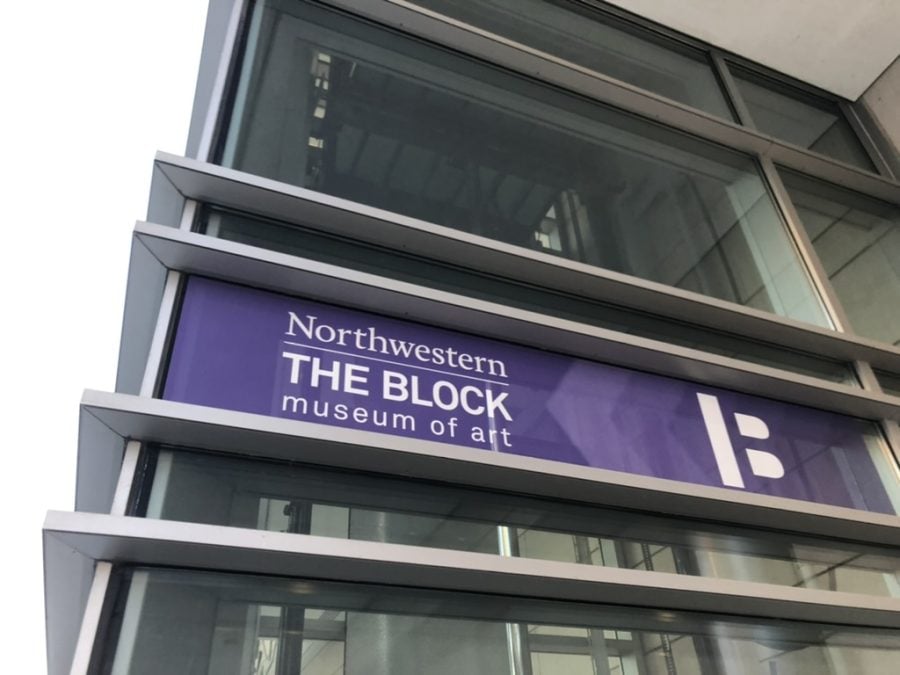“Terra Femme” filmmaker Courtney Stephens holds live documentary-performance at Block
Jonah Elkowitz/The Daily Northwestern
“Terra Femme,” an all-archival documentary performed with live narration by Filmmaker Courtney Stephens at The Block Museum, grapples with gender, travel and perspective.
February 14, 2022
Filmmaker Courtney Stephens’ “Terra Femme” came to The Block Museum of Art Friday in a live documentary-performance format.
“Terra Femme” is an all-archival film comprised of amateur travel footage shot by American and British women in the 1920s-50s. It investigates intersections of gender, perspective, travel and movement. Stephens presented the film at Block Cinema and performed a live narration to accompany the film.
Stephens, a nonfiction and experimental filmmaker, said her inquiry focused on women’s use of cameras and how their positionality has informed their filmmaking. “Terra Femme” was converted to film format for online viewing during the pandemic, but Stephens said her project is better communicated through its live version.
“(Live narration) emulates the way this kind of material might have been presented at the time these documents were made,” she said. “But also, my presence and the stakes of the inquiry for me and my own position in the world is pertinent to the project.”
Kathleen Sachs, a film critic who covered “Terra Femme” for independent and underground film magazine Cine-File, said the documentary-performance format succeeded in situating viewers in the Vaudeville-era practice of live narration.
“There is something to be said about hearing it live,” Sachs said. “It was really impactful.”
The film’s exhibition at Block Cinema was followed by a Q&A with Stephens. She said archival documentary and narrated cinema are a form of self-making, both for herself as an artist and for the women who created the footage: the films, in their archival contexts, seem to say “I exist, I was here.”
Michael Metzger, Pick-Laudati Curator of Media Arts at Block, said Stephens’ archival films “create a constellation of moving images that is really beguiling.”
“I’ve always been struck by Courtney’s ability to work with archival material in a way that feels very personal,” Metzger said. “I thought this would be something really perfect for Block Cinema and the space we try to create.”
This space is one that emphasizes dialogue and learning just as much as cinema itself, Metzger said.
Metzger said the Block Cinema explores film not only as an art form, but also as a unique form of knowledge production.
“We’re particularly interested in filmmakers who are not just invested in film as a form of entertainment, but who approach film as a form of inquiry that extends beyond just the world of film itself,” Metzger said.
According to Metzger, “Terra Femme” makes the cut. Its investigation of the female gaze dovetails an exploration of colonialism in filmmaking, he said.
Footage in “Terra Femme” features the work of colonial women and American and British women who were wealthy or well-resourced enough to travel to far corners of the globe. These travel films reflect a legacy of colonialism in travel and tourism, Stephens said. Moments in the film feel voyeuristic: frames of locals going about their daily lives, quotidien scenes of foreign landscapes that differ starkly from those of America or Britain.
This voyeurism underscores discrepancies in access to filmmaking, travel and the historical archive, issues Stephens considered throughout the project, she said. While white perspectives remain well-documented, non-white, non-Western perspectives are not.
Stephens said “Terra Femme” faces archival coloniality head-on. It examines how filmmakers’ positionalities may have impacted the optics and perspective of the films themselves.
Lack of diversity in film archives troubled Stephens as this project unfolded, she said. But her perspective shifted as “Terra Femme” developed.
“It became an interesting problem,” Stephens said. “It says so much about archives and about the history of filmmaking, about access to materials … This caused me to expand the nature of this inquiry and dislodge a lot of assumptions I first brought to this material – that this is colonial material and not worth looking at.”
Email: kalinapierga2023@u.northwestern.edu
Related Stories:
— Mostra Film Festival brings Brazilian film “Pacarette” to Fisk Hall



